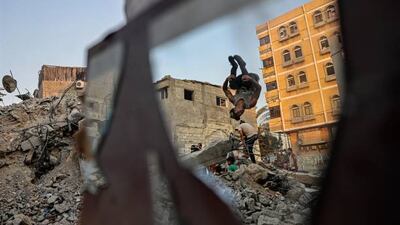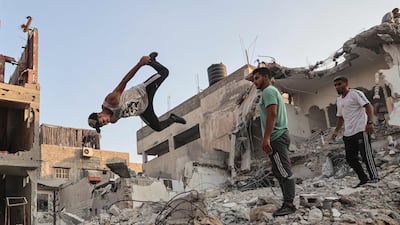No one embodies the spirit of the Gazan people quite like its parkourists. Since 2005, young men from the strip have banded together to turn their besieged home into an obstacle course, flying through the air among its bombed ruins. To many across the world, as clips of their feats spread, they’ve become a symbol of its humanity and its indefatigability during Gaza’s darkest moment than ever before.
In 2014, Palestinian filmmaker Areeb Zuaiter first became entranced by the parkour athletes of Gaza. She was living in the United States, far from her birthplace of Nablus in the West Bank, but in them she saw the defiant beauty of her people. For 10 years, she followed their exploits, befriending key members and documenting their stories with no clear end in sight – until the current Israel-Gaza War began and a tragic moment changed everything.
“In January, we lost the Gaza Parkour member Saeed Al Tattari,” Zuaiter tells The National. “He and his brother were helping people out from under the rubble when another shelling happened and took their lives away – martyred them. It was devastating.
“It was that point when we realised we have to stop filming and show the world what Gaza looked like. We needed to show that there was life – that there were people who were trying to make life out of nothing.”
Those efforts have become the feature-length documentary Yalla Parkour, which is being screened today, for the first time in the Middle East, at the Red Sea International Film Festival. It is a rich document, featuring many of the viral clips that made many of the Gazan athletes famous. It explores the context in which they were filmed as well as the personal journeys of those that shot them.
What struck Zuaiter most was how the young men dealt with the situation as they followed each Israeli bombing campaign by scouting new locations to perform their stunts.
“I started following them after the 2014 offensive, which was 50 days' long,” Zuaiter continues. “And then another offensive happened in 2018 and in 2020. Every time they came back with wide smiles, sense of humour, commenting and laughing on the situations that happened during war.
“It's really fascinating how they react to it, how they come out of it, and how they defy it. It is significant. I don't know if it comes from them getting used to it, or is it just part of their life, or it's sad, but I can’t help but find it heartening.
“Gaza parkourist Abdallah Al Qassab told me, ‘whenever I jumped up in the sky, I felt like I'm free. I'm breathing, I'm living. I come down and I back on Earth, and I see all these real-life obstacles. We're living in the definition of the sport itself. It's jumping from one point to the to the other and defying obstacles’.”
Much of the film follows Ahmed Matar, now 28, who has built a large global following on his Instagram account. Matar, he explains to Zuaiter in the documentary, started filming because he hoped the world would see, so that he may someday work his way into better circumstances abroad.
In 2017, after years of trying, Matar received a visa to attend a tournament in Sweden, eventually gaining residency and finding work as a parkour trainer. While it was a moment of elation for Matar, his new life has become bittersweet: he remains disconnected from his family and his home.
“When we were first filming, I used to say that Ahmed was locked in, but now he’s locked out,” says Zuaiter. “He no longer has access to his family. He no longer has a community. He’s always with them on the phone, but his real life is empty. He’s physically in Sweden, but mentally he’s home. I’ve had that feeling ever since I left Nablus, and I realise that he’s been developing it as well.”

Even though the film is completed, Matar’s story continues. While his family still in Gaza may not be parkourists, they share the defiant spirit that once propelled him into the air as a young boy.
“His mum and the rest of their family have been living in refugee camps and other people’s houses,” says Zuaiter. “But then she decided she doesn’t want that life any more. Their house got bombed and there was only one room left standing, so she decided to go back to that room.
“Now they’re living there, with just a piece of cloth to give them privacy, but they’re fine with that. They are living day by day amid this harsh situation.”
Yalla Parkour screens on Friday at the Red Sea International Film Festival in Jeddah








